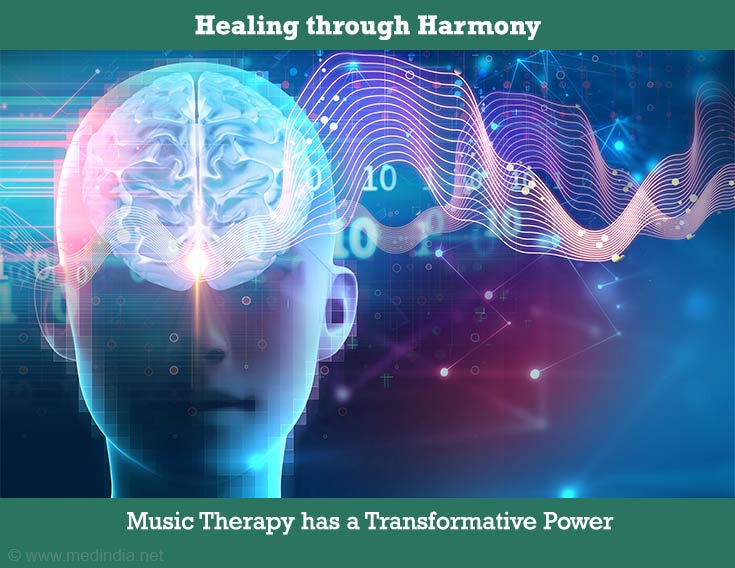- Bodily maps of musical sensations across cultures - (https://www.pnas.org/doi/10.1073/pnas.2308859121)
- How Music Helps People Heal: The Therapeutic Power of Music - (https://www.harmonyandhealing.org/how-music-helps-people-heal/)
- Rhythm and Music-Based Interventions in Motor Rehabilitation: Current Evidence and Future Perspectives - (https://www.ncbi.nlm.nih.gov/pmc/articles/PMC8801707/)
- Music therapy is a potential intervention for cognition of Alzheimer's Disease: a mini-review - (https://www.ncbi.nlm.nih.gov/pmc/articles/PMC5267457/)
- Music therapy: An effective approach in improving social skills of children with autism - (https://www.ncbi.nlm.nih.gov/pmc/articles/PMC4550953/)
- Music Therapy in Hospice and Palliative Care: a Review of the Empirical Data - (https://www.ncbi.nlm.nih.gov/pmc/articles/PMC1142188/)
About
In an era where language, culture, and experiences vary vastly, there exists a remarkable phenomenon that transcends these boundaries - music. Music, with its innate ability to evoke emotions and stimulate bodily sensations, has long served as a source of solace, expression, and connection for individuals across diverse backgrounds and cultures. Recent research has shed light on the profound impact of music therapy, harnessing the universal language of music to address a myriad of physical, emotional, cognitive, and social needs.
Did You Know?
Music therapy has been used as a form of healing for thousands of years, with evidence of its practice dating back to ancient civilizations such as Egypt, Greece, and China. In these ancient cultures, music was believed to possess mystical and therapeutic powers, capable of soothing the soul, healing the body, and connecting individuals to the divine.Healing Through Bodily Sensations and Emotional Connection
Music is a visceral experience that transcends the boundaries of language and culture, resonating deeply within us to evoke a symphony of bodily sensations and emotional responses. When we listen to music, whether it's the pulsating rhythm of a drum or the ethereal notes of a piano, we feel it in our very bones. The power of music to evoke physical sensations is profound, with certain melodies and rhythms stirring the soul and igniting a cascade of emotions.
Through music therapy, individuals can explore the intimate connection between music, emotions, and bodily sensations in a safe and supportive environment. Whether it's the uplifting strains of a joyful melody or the melancholic strains of a somber tune, music has the ability to touch us at the deepest level, providing comfort, catharsis, and healing(1✔ ✔Trusted Source
Bodily maps of musical sensations across cultures
Go to source).
Psychological and Emotional Health: Healing Through Music
Music therapy offers a sanctuary for emotional expression and healing, providing individuals with a unique avenue for exploring and processing their innermost thoughts and feelings. In the therapeutic space, individuals can journey through the landscape of their emotions, finding solace and understanding amidst the harmonies and melodies of music.
From stress reduction and mood regulation to trauma recovery and self-expression, music therapy encompasses a wide range of techniques and interventions designed to promote psychological and emotional well-being. Through personalized playlists, improvisation, and lyric analysis, individuals can navigate the complexities of their emotions, fostering resilience and emotional growth along the way(2✔ ✔Trusted Source
How Music Helps People Heal: The Therapeutic Power of Music
Go to source).

Physical Rehabilitation: Dynamic Tool for Physical Well-Being
In the domain of physical rehabilitation, music therapy serves as a dynamic tool for enhancing motor skills, managing pain, and promoting recovery. Through rhythmic patterns and movement-based activities, individuals engage in a symphony of motion, reawakening dormant muscles and restoring balance and coordination.
Music's innate ability to alleviate pain and discomfort offers a holistic approach to rehabilitation, complementing traditional medical interventions and enhancing the overall healing process. Whether it's through drumming, dancing, or therapeutic exercises, music therapy empowers individuals to reclaim their bodies and embrace a newfound sense of vitality and well-being(3✔ ✔Trusted Source
Rhythm and Music-Based Interventions in Motor Rehabilitation: Current Evidence and Future Perspectives
Go to source).
Cognitive Enhancement: The Potential of the Mind
Music therapy offers a gateway to cognitive enhancement, empowering individuals to tap into the limitless potential of the mind. Through engaging musical activities such as singing, listening, and improvisation, music therapists harness the neuroplasticity of the brain, stimulating neural pathways associated with memory, attention, and cognitive function. Music becomes a catalyst for cognitive vitality, awakening dormant faculties and fostering mental acuity.
In the domain of cognitive enhancement, music therapy holds immense promise for individuals with dementia, cognitive impairments, or neurological disorders. By engaging in structured musical exercises and memory recall techniques, individuals can strengthen cognitive reserves and enhance cognitive flexibility. Music therapy becomes a dynamic tool for preserving cognitive function and promoting independence, enriching the lives of individuals and their caregivers alike(4✔ ✔Trusted Source
Music therapy is a potential intervention for cognition of Alzheimer's Disease: a mini-review
Go to source).
Social Skill Development: Harmonizing Connections Through Music
Music therapy serves as a crucible for social skill development, nurturing interpersonal connections and fostering a sense of belonging. Through collaborative musical experiences, individuals learn the art of communication, empathy, and cooperation. In the symphony of voices and instruments, barriers dissolve, and communities emerge, united by a shared love of music and a common bond of humanity.
Within the therapeutic space, music therapists facilitate group dynamics and interpersonal interactions, creating opportunities for individuals to express themselves authentically and connect with others on a deeper level. Through improvisational games, group sing-alongs, and musical storytelling, individuals develop essential social skills such as active listening, turn-taking, and perspective-taking. Music therapy becomes a catalyst for social cohesion and emotional resonance, enriching lives and strengthening relationships(5✔ ✔Trusted Source
Music therapy: An effective approach in improving social skills of children with autism
Go to source).
Palliative Care: Embracing Comfort and Compassion Through Music
In the tender embrace of palliative care, music therapy offers solace, companionship, and a sense of peace. Amidst the challenges of end-of-life support, music becomes a beacon of light, guiding individuals through the final chapters of life's journey. Through personalized playlists, live performances, and therapeutic singing, music therapists provide emotional support and spiritual nourishment, honoring the dignity and resilience of the human spirit.
Music therapy becomes a source of comfort and companionship for individuals facing terminal illness or navigating the complexities of grief and loss. By creating a soothing and supportive environment, music therapists empower individuals to find meaning and solace in the midst of adversity. Music becomes a timeless expression of love, compassion, and remembrance, enriching the lives of individuals and their loved ones as they embark on the journey of transition and transformation(6✔ ✔Trusted Source
Music Therapy in Hospice and Palliative Care: a Review of the Empirical Data
Go to source).













